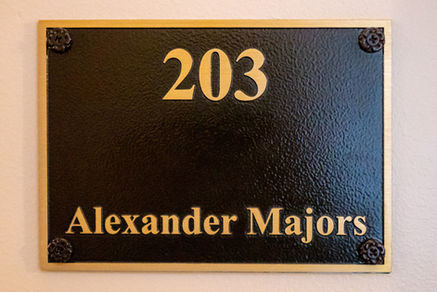

Alexander Majors
Room 203
Alexander Majors was born on October 4, 1814, in Simpson County near Franklin, Kentucky, the eldest of a family of two boys and a girl. When Alexander was about five years of age, his father moved the family to Missouri, when the state was still a territory. Alexander soon became a married man with daughters, when he found it impossible to meet his growing necessities as a struggling Cass County farmer.
In desperation, he turned to the freighting trade. His six wagons and teams set the groundwork for business that would later give Majors a worldwide reputation as a freighting genius. Majors ran his wagons in trains of 25 each, pulled by at least a dozen oxen. He usually rode alongside the train, communicating his instructions with pony-mounted messengers. One such runner got his start when his mother asked Majors to give her 12-year-old son a job. Majors hired him and later taught him to read and sign his name. This was little Willy Cody who became a part of American folklore as “Buffalo Bill” Cody. Cody became a wagon master, and later one of the most famous of the Pony Express riders. Buffalo Bill had this to say about Alexander Majors: “Every man, from wagon boss and teamster down to rustler and messenger boy, seemed anxious to gain the goodwill of Alexander Majors and to hold it, and today he has fewer foes than anyone I know, in spite of his position as chief of what was certainly a wild and desperate lot of men.”
The growth and prosperity of Kansas City and much of the Western United States can be attributed to Alexander Majors. He and his great freighting firm, Russell, Majors, and Waddell, are responsible for establishing Kansas City’s commercial destiny along with the foundation and principles on which the west was built. Major’s freighting company started the Pony Express. The business originally intended to cross the west once a week, moving important mail on horseback. Its patrons included the U.S. Government, newspapers, banks, and businesses. Civil War soon came along, and Edward Creighton and his associates completed the transcontinental telegraph in unexpectedly fast time which put the Pony down for good. Majors did not compose his memoirs until the end of the 19th century and his life story was then heavily edited by Colonel Prentiss Ingraham, a fabled dime novelist. Buffalo Bill paid to print the memoirs. Majors later complained that Colonel Ingraham had taken liberties with the story.
(The Alexander Majors room features 1 Queen Size bed, a single lavatory, & a shower. All rooms have wired and wireless internet & individual heat/ac. Facing East towards the Railroad Tracks and Broadway)












